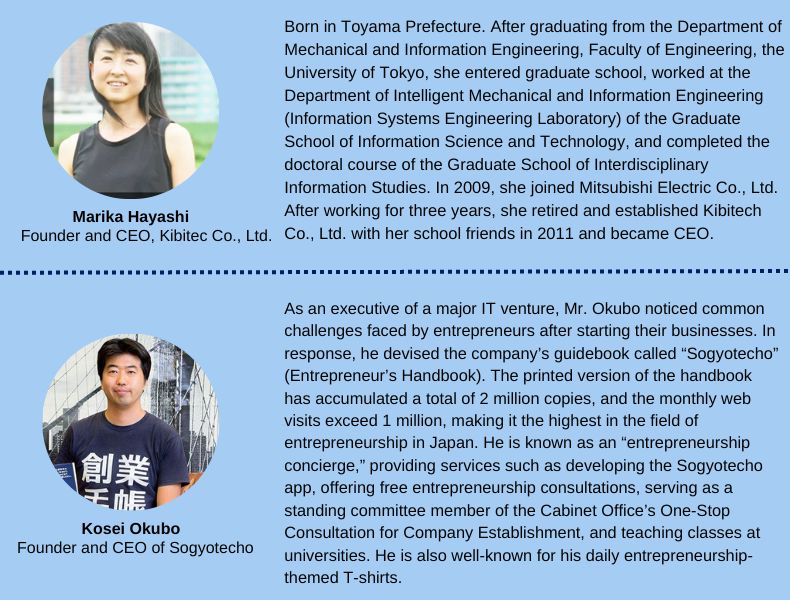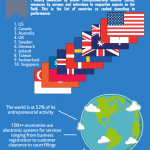What Future Do Female Engineers and Entrepreneurs Envision?
The robot business is rapidly expanding its market globally against the backdrop of labor shortages. Recently, the use of AI has progressed, and the need for robots is expanding in many fields.
In line with this, Qibitech Co., Ltd. is attracting attention as a robot business venture originating from the University of Tokyo. In March 2024, approximately 800 million yen was raised, and further growth is expected.
“We want to increase the work of robot operators using our technology and solve social problems.” Marika Hayashi, founder and CEO of Qibitech, says. Having a baby was the reason why she began paying attention to social issues.
Here’s the interview of Mr. Kosei Okubo, the founder and CEO of Sogyotecho, with Ms. Hayashi on how she overcame the challenges and grew the business.
About the interviewer, Mr. Kosei Okubo and interviewee, MS. Marika Hayashi

We want to use a remote control robot system to solve economic problems in developing countries.
Okubo: Ms. Hayashi, was it the research you were conducting at the University of Tokyo that made you interested in robots?
Hayashi: That’s right. Originally, when I was studying at the engineering department of the University of Tokyo, I came across the Robocon Circle, which led me to go on the path of robots. After that, I joined JSK (Information Systems Engineering Laboratory), which is known for its research on humanoid robots.
This lab produces many entrepreneurs and startup CTOs. For example, some entrepreneurs have worked on a project with NASA and built robots that have gone into space. In fact, there were many people like that around me.
Okubo: Ms. Hayashi, did you not start a business right after graduation and get a job?
Hayashi: After graduating from graduate school, I got a job at a manufacturing company. I had a strong passion for doing electronic work.
After that, I applied for and was selected for the “Unexplored Project” by the Information-Technology Promotion Agency (IPA), which aims to discover and nurture young talent. There, I had the opportunity to work with Professor Hiroshi Ishiguro from Osaka University, known for his work in android development, who became my mentor. Together, we developed a technology for sensing delicate human interactions. This technology was highly regarded, and I decided I wanted to work with the members I met during the Unexplored Project. Consequently, I left the manufacturing company after three years and became independent.
When I thought about what I could do as someone running a robotics technology company, I started to believe that the job of a robot operator could help solve social issues.
The idea is that by increasing the number of jobs for “robot operators” who control robots remotely, we could, for example, establish operation centers in impoverished regions of developing countries. This would allow people in those regions to work without having to migrate to developed countries for employment. In other words, it could help solve economic problems in developing countries. This felt like a second founding for the company.
Okubo: I ask readers to imagine it easily, but how do developing countries work using your company’s technology?
Hayashi: First, we introduce transport robots equipped with remote control systems in warehouses. These are robots that carry carts loaded with cardboard boxes.
Even simple tasks like transporting items can be challenging for robots to execute perfectly. When a robot encounters an obstacle and stops, it can’t understand why the obstacle is there. If someone is standing in the way, a human can ask them to move, but robots can’t handle such situations flexibly.
So, occasionally, robots do stop for various reasons. When they do, the system detects it and sends a notification, allowing an operator to use a mouse to give the robot movement instructions. This can be done remotely, meaning the operator can be located anywhere.
Although we haven’t yet established overseas bases, we have conducted a trial by outsourcing simple operations to Cambodia. This experience gave us confidence that, with careful steps, this approach can be realized.
Moreover, remote control of robots isn’t only for overseas operations but can also be envisioned for people who are homebound, for instance.
After starting the company, there were also crises such as staff leaving. The turning point was when we clarified our mission.
Okubo: Did the pace of business growth change since you entered the second start-up aimed at social significance?
Hayashi: When I first started my business, I felt like my hobby had already improved. Now that I think about it, this wasn’t good. It was difficult to get involved except for engineers who sympathized with me, and it was difficult to think about how to approach the market.
Also, right after starting a business, the business was like a “game where it came out”, and the business was also trial and error. As a result, some staff members said, “There is no point in staying in this company,” and took customers and became independent. After all, I think that the lack of a clear vision or mission led to the departure of the staff.
After giving birth, I began to think deeply about life and business. Also, being a single mother, I realized that there was only so much I could do in life, and from there, I wanted to do what I could for my children’s future.
After thinking about the company’s mission based on the desire for children and social significance, I proudly said, “This is my mission.” I’ve come to say that. In addition, I was able to firmly say social significance through my mission when gathering friends and raising funds.I think that the business accelerated from this second start-up.
Okubo: I’m sorry to ask about your personal life, but there was talk about being a single mother. Starting a business is a big hurdle for both men and women, but I think it is difficult to start a business while raising children. Could you tell us what you were aware of when you started your business?
Hayashi: I have time constraints, so I have management and other members share the work. I am really grateful to the members.
I think this situation is probably something other entrepreneurs face. What I have valued in such a situation is the design of the management team. When gathering colleagues, I explained my situation and made sure to convey in advance that ‘the scope of work I can do is up to here, so I would like to ask for other things.
However, when you get excellent members to gather like that and divide the work, you ask, “What is my value?” The question came up. I am still looking for this place, but I think that the meaning of my existence is to express my mission and philosophy more deeply with a story that only I, the founder, can tell.
Okubo: You are currently looking at things other than technology such as sales and management. You said that curiosity as an engineer was your motivation when started the business, didn’t you feel reluctant to change your role?
Hayashi: In my case, there were many excellent engineers around me. Even during the robotics, I felt rewarded when I supported such colleagues and moved towards achieving the goals of the entire team. So I didn’t feel too uncomfortable with the change in role.
Our strengths are our skilled personnel and experience. We aim to go public within the next few years.
Okubo: Could you tell me about your current business?
Hayashi: Currently, there are two main businesses: one is a contract development project for robots, and the other is a highly autonomous teleoperation service (HATS) platform project using a remote control system developed by our company.
Contract development of robots has been a business since its foundation. Since on-site work can be automated through contract development, we believe that it will lead to solving social problems such as labor shortages.
Another HATS platform business is to provide a robot remote control system, which, as I mentioned earlier, can remotely control robots from developing countries. It has social significance that employment opportunities can be equalized regardless of location or physical condition.
Okubo: In your case, what kind of stakeholders do you have?
Hayashi: In terms of contract development projects, it’s a robot manufacturer. We are developing robots in collaboration with manufacturers.
In the case of the HATS platform business, we are doing business for various players such as end users, robot Sier, trading companies, and manufacturers.
For example, in the case of robot manufacturers, remote systems and operation management systems will be introduced. In addition, since we are also doing business from the standpoint of Sier, we sometimes provide solutions to end users from the standpoint of Sier. Our system has the advantage of being able to manage robots from multiple manufacturers in an integrated manner and operate them efficiently.
Okubo: I see. What are your company’s strengths?
Hayashi: One of our strengths is software technology such as robot control. Our company has me, CTO, and other members who studied humanoid robots at JSK. I don’t think there are many Japanese startups with such robot development technology.
Founded in 2011, our company has more than 10 years of extensive development experience. I don’t think there are many companies in the robot industry that have a lot of experience in robot development so far, so I think we can use that as a strength.
Okubo: Can you tell me about future developments?
Hayashi: In the future, we will work on remote control systems as well as other technologies. I would like to expand my business further and increase the number of industries and phases that I can aim for. Also, the company is aiming for an IPO within the next few years by further increasing sales.
Japan’s robot industry has world-class technology and potential for future growth.
Okubo: It is said that Japan lags behind Europe and the United States in the field of AI, but I feel that Japan still has a chance in the field of robots. Ms. Hayashi, could you tell me about the potential of the Japanese robot industry?
Hayashi: As you said, I think Japan’s robot technology is ahead of the rest of the world. However, in terms of hardware, Chinese manufacturers are offering cheap products. So when it comes to hardware, I think China will grow in the future.
However, in the case of robots, hardware alone is often not available in the field. Since it must be moved flexibly, detailed software development is necessary for that purpose. In addition, it needs to be well linked to peripheral devices such as sensors.
This is exactly what the robot Sier people are working on. I think that the reason why the Japanese robot industry is able to maintain its strength in the world is because of the thick layer of robot Sier.
Also, software is said to have a higher growth rate as a market size. The Japanese robot industry has high technology and potential for future growth. Our company also wants to provide products using a wider range of technologies.
Advice to starting entrepreneurs
Okubo: Finally, could you give some advice to those who are on the verge of starting their own business?
Hayashi: There are two important things I believe are crucial for an entrepreneur. One is to have a clear mission that you can call your own and to have strong determination.
There was a time when I faced a very tough negotiation and wondered, “How can I get through this?” I recalled an episode about Masayoshi Son, the founder of SoftBank. When he was entering the telecommunications business, he went to the Ministry of Internal Affairs and Communications and said, “I am risking my life to pursue this socially significant business. If this entry into the telecommunications business doesn’t go through, I will end my life right here. That’s how determined I am.”
As a founder, there will likely be moments when you need strong resolve to get through tough situations. In my own difficult negotiations, I approached them with the mindset that I was putting my life on the line. Having such determination is crucial, and those who reach that level of commitment are undoubtedly strong.
The second thing I think is important for a founder is humility. When you hire people who are more talented than you, the company will gradually be filled with people who are better than you. This means you are no longer the most skilled person in the room, so being arrogant as a founder won’t help you build a team. Especially for someone like me, who is a technologist starting a business, a certain degree of humility is essential.
Humility helps you learn from others, fosters collaboration, and ensures that you can lead a team effectively, despite not being the most talented individual in every area. Balancing strong determination with humility is what I believe makes a successful entrepreneur.
Disclaimer: This article is an English translation of the original content published on the website sogyotecho.jp, which is the parent company of the Founders Guide website. The translation aims to provide information to English-speaking readers while maintaining the essence of the original article. Please note that any discrepancies or inaccuracies in the translation are unintentional. For the most accurate and up-to-date information, kindly refer to the original article in Japanese on sogyotecho.jp











